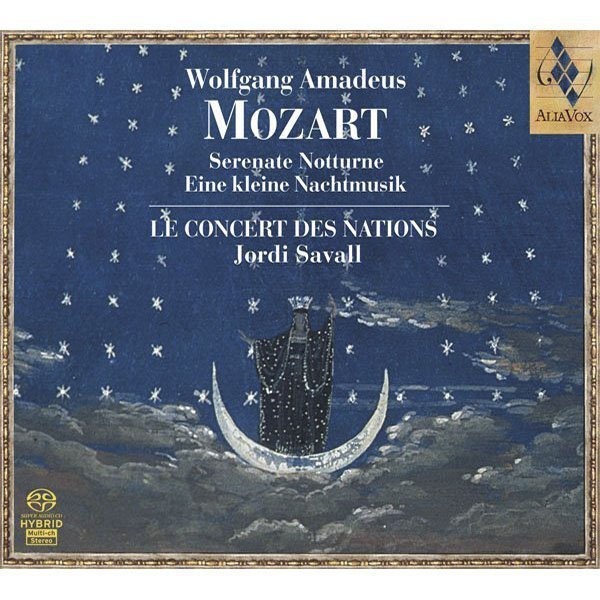WOLFGANG AMADEUS MOZART
Serenate Notturne
Jordi Savall, Le Concert des Nations
17,99€
Ref: AVSA9846
- Le Concert des Nations
- Jordi Savall
Mozart’s career can be divided neatly into two distinct periods: before and after his return to Salzburg in January, 1779, following his trip to Mannheim and Paris. He was twenty-three years old. Two years later, he took up residence in Vienna, where he was to spend the greater part of the next ten years until his death. With one or two exceptions, most of the composer’s greatest works belong to the second half of his life. Until 1781 he had travelled extensively, but his roots were always in his native Salzburg. Of the four works featured in this CD, the earliest two were composed in Salzburg, while the other two were composed in Vienna some ten years later. Three of these works have nocturnal associations – not in any Romantic sense, but according to the 18th century sense of the term “notturno”, as applied to compositions belonging to the divertimento or serenade genre, intended primarily, although not exclusively, for evening or night performance. The two Salzburg pieces and the two composed in Vienna both form natural, albeit quite different pairs.
Mozart lived in Salzburg under the reign of two prince-archbishops: Sigismund Christoph von Schrattenbach (1698-1771), prince-archbishop from 1753, and Hieronymus Franz Joseph von Colloredo (1732-1812), who was elected on 14 March 1772 (in the forty-ninth round of voting!) by the canons of the cathedral. As the candidate of the court of Vienna, Colloredo received a rather cool reception. One of his first official decisions was to award Mozart an annual stipend of 150 florins for his services as Konzertmeister (violinist). This was the first salary to be earned by the young composer, then aged sixteen. Colloredo rapidly distanced himself from the policy of his predecessors. An advocate of Enlightenment principles and averse to the pomp and magnificence of the Baroque age, his study was presided over by the busts of Voltaire and Rousseau. Although Salzburg’s cultural life in general benefited a great deal from the new archbishop’s approach, its musical life suffered; in fact, a drastic reduction in public spending coupled with stringent new tax laws – Schrattenbach’s reign had left the state coffers practically empty – resulted in severe cutbacks in the financial rewards traditionally enjoyed by musicians. Despite the impact that these changes had on the musical life of Salzburg, they also gave rise to new forms of musical activity. In the mid-1770s, most of Mozart’s instrumental works were composed not for the court, although many of them were performed there, but for private patrons other than Colloredo or for performance at private concerts, a practice in which Mozart was encouraged by his father, Leopold. Hence the place in posterity of the Lodron, von Lützow and Haffner families. These often charming, delightful pieces, for which Mozart received payment in most cases, demonstrate the appreciation and support that Mozart received in Salzburg. They also served as a showcase for his skills as a virtuoso performer and enabled him to develop as a composer.
+ information in the CD booklet
MARC VIGNAL







Share